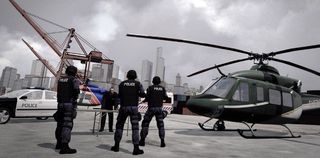Interview: Bohemia Interactive's CEO on fighting piracy, creative DRM

DRM is among the worst things ever to happen to gaming. In many cases it's intrusive, infuriating, and the worst DRM can even stop your legitimately purchased game dead in its tracks. But hey, at least DRM finally made piracy walk the plank and cackled maniacally as our team of trained sharks devoured it forever, right? Oh wait - piracy's still alive and kicking, and pirates can now rationalize their actions by saying "I want to get the version that works." So what's the gaming industry to do?
Many developers and publishers are stumped, and some flailing wildly by locking down games even harder. All hope, however, isn't lost: a few studios have begun to experiment with copy protection, and results have run the gamut from hilariously amusing to, well... mostly that first thing , so far. But are they really cutting down on piracy? That in mind, I decided to quiz Bohemia Interactive CEO Marek Špan?l about all things DRM. His company, of course, has been turning heads with its DEGRADE (often erroneously referred to as "FADE") tech, which slowly renders pirated copies of games like Take on Helicopters unplayable. Check out the full interview for his thoughts on just how bad piracy really is, ending the trend of intrusive DRM, "always on" schemes like Battle.net and UbiDRM, and much, much more.
PC Gamer: What prompted you to battle piracy with FADE? What's the general philosophy behind it?
Marek Špan?l: Please note that we do not call it FADE, but rather DEGRADE, as the term FADE was initially used by a previous publisher and we don't feel it's our trademark to use. We've used DEGRADE for all our releases since our PC debut, Arma: Cold War Assault, in 2001 (originally released as Operation Flashpoint: Cold War Crisis). The philosophy is not to try to prevent counterfeit and pirated games from running, but instead (or in addition) to degrade the end user experience of such copies.
The motto is: Pirated games are not worth playing, original games do not degrade. Some of the symptoms are funny, usually annoying. In the Arma series, players with pirated copies have lower accuracy with automatic weapons in both single player and multiplayer, and occasionally turn into a bird with the words "Good birds do not fly away from this game, you have only yourself to blame." While we know we will never stop piracy, we use this as a way to make our stand that piracy is not right, that it has a serious negative impact on PC games developers.
PCG: DEGRADE's a very unique, outside-the-box method of mitigating piracy. Do you think that's the key to staying afloat in a PC world full of pirates?
MS: Maybe. But I'm afraid there isn't much that can be done to mitigate piracy as far as we talk about the offline single-player experience. But we need more people to realize that there is value in owning the original game. By buying the game they support us, and we can support them in exchange.
The biggest gaming news, reviews and hardware deals
Keep up to date with the most important stories and the best deals, as picked by the PC Gamer team.
PCG: Does DEGRADE actually deliver results? Are your piracy rates significantly lower than they would be without it? Can you provide any numbers?
MS: It's not possible to provide any numbers. However, our statistics from multiplayer show that for every three legitimate buyers playing their game in multiplayer, there are 100 (failed) attempts to play with a pirated version. This indicates that piracy is an extremely widespread problem on PC, and it's also really worrying for us as a mid-sized, independent, PC-oriented developer. We do not have any such data for single-player, but I'm afraid there the ratio of pirates to legitimate gamers is undoubtedly much worse.
PCG: That's absolutely terrifying, to be honest. Do you happen to know how DEGRADE stacks up to more traditional means of copy protection - say, Ubisoft's much-maligned online system or Steam copy protection?
MS: We don't consider it a substitute to conventional copy protection, but rather as a supplement to it.
PCG: Why do you think so many developers and publishers are stuck on using DRM that inconveniences paying customers just as much as pirates? Their most vocal and loyal customers are shouting, "No! This is terrible!" at the top of their lungs. So why is it taking so long for them to listen?
MS: It's very difficult. Companies and teams invest a lot into game development, and with such widespread piracy, it's extremely tough to get the investment back. Our approach is to remove conventional DRM not too long after the initial game's release to ensure as smooth an experience as possible for our legitimate users and still appeal to our distribution and publishing channels. We're trying to cut off this vicious circle where piracy hurts owners of legitimate copies "protected" with annoying copy protection DRM systems, which may lead to more piracy. That is why, for example, nearly all games on Sprocket, our online store, are DRM-free. Arma 1 and 2 are already copy-protection-free everywhere, and have been for a long time.
Most Popular




